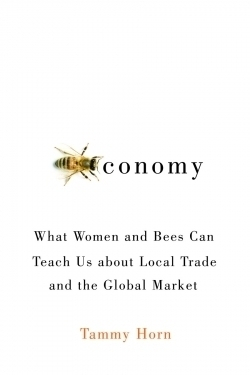
Beeconomy
What Women and Bees Can Teach Us About Local Trade and the Global Market
Beekeepers around the world are struggling with “colony collapse,” a process whereby bees are disappearing at an alarming rate. This challenging situation highlights many issues about the role that bees play, including sustainability, nutrition, economic disparities, and environmental policies. Particularly interesting is the part that women have played in the beekeeping world, believes author Tammy Horn, and how their expertise might help to usher in both a new era and a new economy.
“The rises and precipitous falls of women beekeepers make for a fascinating tale when one considers that women often have been disenfranchised of property ownership, advanced educational opportunities, and financial subsidies,” she writes.
Horn is well qualified to delve into the beekeeping world. Raised with beekeepers on both sides of her family, she’s now the director of Coal Country Beeworks, a multi-service project in eastern Kentucky that focuses on reclaiming habitat for pollinators. She’s also published a previous book on the topic, Bees in America: How the Honey Bee Shaped a Nation.
In this engaging, deeply researched investigation of the interplay between women and beekeeping, Horn goes beyond looking at hive-related products like beeswax, honey, and cosmetics, and explores the potential for beekeeping to change family dynamics and even the global economy. She traces the evolution of the relationship between women and bees from the honey hunters of Africa to the researchers of Europe to the enthusiastic beekeepers of South America.
Throughout, she delves into the ways that women make a contribution to the health and reach of bees, but how they’ve rarely gotten much credit. She writes, “Currently, industrial agriculture and even industrial apiculture do not ‘count’ women beekeepers in the market economy, which measures profits and bottom lines. But it does not have to be this way.”
Horn proves adept at blending larger thoughts on economic conditions with accessible stories of individual beekeepers and their lives. Showing how often the political is personal is a stellar way of highlighting the similarities among cultures and among women.
Merging political economy with apiculture, Horn presents compelling evidence of how women have made strides in the beekeeping realm, but often without recognition. Hopefully, this important work will be the first step toward illuminating their contributions, and helping many more to follow in the footsteps of their mothers and grandmothers.
Reviewed by
Elizabeth Millard
Disclosure: This article is not an endorsement, but a review. The publisher of this book provided free copies of the book to have their book reviewed by a professional reviewer. No fee was paid by the publisher for this review. Foreword Reviews only recommends books that we love. Foreword Magazine, Inc. is disclosing this in accordance with the Federal Trade Commission’s 16 CFR, Part 255.
